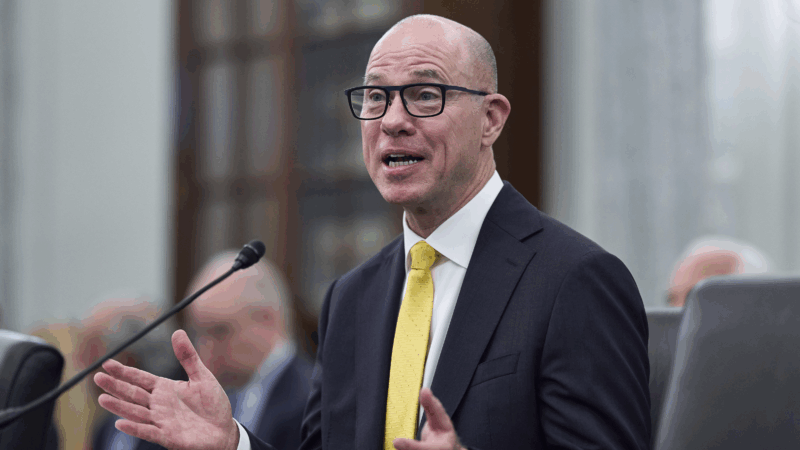Senators grill Trump’s FAA nominee over past effort to alter pilot certification rule
Republic Airways CEO Bryan Bedford faced questioning from a Senate committee Wednesday in his effort to become the next administrator of the Federal Aviation Administration, including questions about his company’s failed attempt to certify pilots with just half of the flight hours required by the federal government.
Bedford, who’s led the regional airline since 1999, was announced in March as President Trump’s pick to helm the agency at a critical time for U.S. air travel.
The FAA is contending with renewed safety concerns from lawmakers and the flying public following the deadly collision of an American Airlines regional jet and a U.S. Army Black Hawk helicopter near Washington, D.C., in January, which killed 67 people.
Meanwhile federal officials are grappling with an air traffic control system bogged down by staffing shortages and aging equipment, which recently led to several technological outages at multiple U.S. air traffic control facilities. Last month, Transportation Secretary Sean Duffy announced a multibillion-dollar plan to modernize the nation’s air traffic control system within four years.
Bedford expressed his support for that plan, which includes replacing antiquated telecommunications and radar systems with more modern technology. He said the estimated $12.5 billion in the proposed federal budget would be a “great start” but that the ambitious project would ultimately require “a lot more than that.”
Public safety would be his top priority if confirmed to lead the FAA, Bedford said, adding that a lack of action in response to near-misses at Ronald Reagan Washington National Airport in the years before the January accident was “not acceptable.”
Bedford faced a number of questions about his position on the “1,500-hour rule,” an FAA rule that requires pilots to have 1,500 hours of flight time before they can be certified as commercial pilots.
The mandate came into effect in 2013 following the crash of a Colgan Air turboprop plane four years earlier near Buffalo, N.Y., which killed 50 people. National Transportation Safety Board investigators said after that accident that the pilot responded incorrectly to an aerodynamic stall and wasn’t corrected by the first officer, who lacked experience.
Regional airlines, including Republic, argued that the 1,500-hour rule was partially to blame for a shortage of certified pilots. In 2022, the FAA denied Republic’s request to have graduates from its flight school be certified with only 750 flight hours. Bedford said at the time that he was “disappointed — but not surprised” by the FAA’s decision and said Republic’s proposal “would enhance safety.” If confirmed to lead the FAA, Bedford would have a say in future changes to the rule he once hoped to avoid.
Sen. Tammy Duckworth, D-Ill., a former Blackhawk helicopter pilot, asked Bedford on Wednesday whether he would uphold the 1,500-hour rule if confirmed, but he did not directly answer her question.
“It doesn’t sound like a yes,” Duckworth said. “It sounds like you’re leaving the door open to reduce the number of flight hours below 1,500.”
“What I’m saying is I don’t believe safety is static,” Bedford replied, adding that he wouldn’t compromise safety at the agency.
Family members of those who died in the Colgan Air crash released a statement the day before the hearing expressing “serious concerns” over Bedford’s nomination, saying that “now is not the time to undermine aviation safety regulations.”
In March, Air Line Pilots Association, International President Jason Ambrosi said in a statement that the union was concerned about Bedford’s “past efforts to lower pilot training and safety standards.”
Bedford has received the backing of several aviation industry trade groups, including Airlines for America and the Regional Airline Association, where he is a board member.
Chris Rocheleau, an FAA veteran with more than two decades at the agency, has been serving as the acting FAA administration since January.
Mitski comes undone
She may be indie rock's queen of precisely rendered emotion, but on Mitski's latest album, Nothing's About to Happen to Me, warped perspectives, questionable motives and possible hauntings abound.
This quiet epic is the top-grossing Japanese live action film of all time
The Oscar-nominated Kokuho tells a compelling story about friendship, the weight of history and the torturous road to becoming a star in Japan's Kabuki theater.
The Live Nation trial could reshape the music industry. Here’s what you need to know
On Tuesday opening statements will begin for the federal antitrust trial against Live Nation, one of the largest entertainment companies in the world.
A new one-a-day-pill holds promise for HIV’s ‘forgotten population’
It's designed to take the place of complicated, multiple drug regimens that many people with HIV need to follow. And it's also beneficial because the HIV virus is always evolving.
For filmmaker Chloé Zhao, creative life was never linear
Director Chloé Zhao used meditation, somatic exercises and dance to inspire the cast and crew of this Oscar-nominated story about William Shakespeare's family.
10 new books in March offer mental vacations
March is always a big one for books – this year is no different. We call out a handful of upcoming titles for readers to put on their radars — offering a good alternative to doomscrolling.








